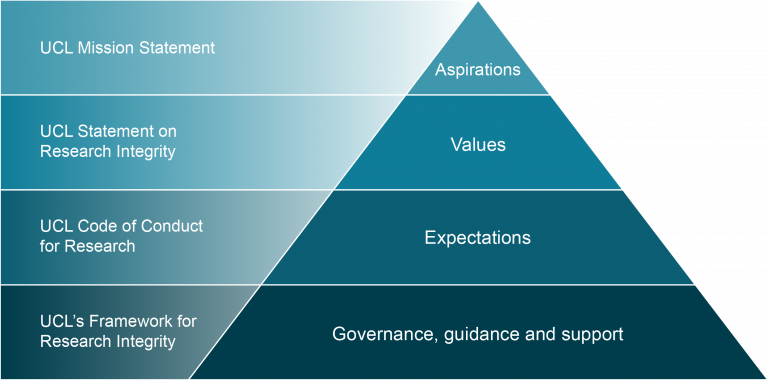UCL Code of Conduct for Research
As set out in UCL’s Mission Statement, UCL is committed to the pursuit of knowledge to change the world for the better. Maintaining the integrity and rigour of our research, helps to enable UCL to realise this aim. Research Integrity governance at UCL stems from our institutional aspirations and values and is designed to support researchers to understand expectations of research, as well as support them in undertaking high quality research.

The UCL principles of integrity set out in UCL Statement on Research Integrity provide the guiding values for all UCL researchers:
- Honesty
- Rigour
- Transparency and open communication
- Care and Respect
- Personal responsibility
These principles are the core of the Code of Conduct for Research and will help you realise the expectations set by the Code in all you research endeavours. This Code applies to all those conducting research at or in the name of UCL, regardless of the source of funding. It is therefore expected that all staff (including honorary staff), students, visitors and collaborators are aware of and adhere to the principles and responsibilities contained within the code.
The updated Code of Conduct was approved for publication by the Research, Innovation and Global Engagement Committee in March 2023, published in April 2023 and replaces all other previous versions of the Code.
You access and download the Code of Conduct for Research via the Research Data Repository where you can also access the accessible Word version.
UCL Code of Conduct for Research (2023)
- How to use this Code
Use of ‘Must’ and ‘Should’ in the Code
Where ‘Must’ is used this indicates a mandatory requirement. Mandatory requirements in the code stem from UCL Policies or UK legislation (as set out in Appendix 2). Failure to comply with the mandatory elements of the Code of Conduct may result in an investigation under the UCL Procedure for investigating and resolving allegations of misconduct in academic research and/or the Disciplinary Procedure (for staff) or the Student Academic Misconduct Procedure (for students). Any legal breaches may result in legal proceedings. In addition, any investigations or breaches may need to be reported to the funder as per their requirements.Where ‘Should’ is used, this indicates actions that normally must be taken unless you have an explicit reason not to. These, while not mandatory, are no less important; they set out UCL’s expectations of how to conduct quality research while maintaining research integrity. Failure to meet these standards may be raised by line managers or supervisors and escalated if necessary and proportionate.
How to raise concerns about the compliance with the code?
Guidance on how to raise concerns can be found on the Help and Guidance page.
Page last updated: April 2023
 Close
Close




